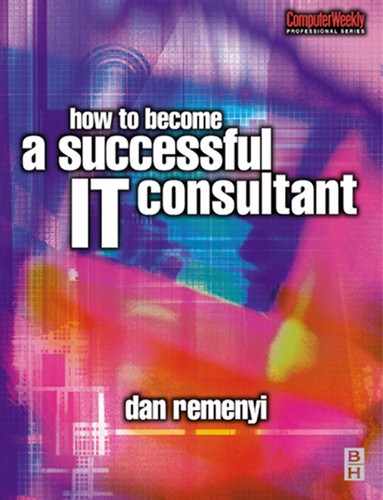Consulting and finding a product |

Anyone that tells you it is easy to change the way groups do things is either a liar, a management consultant or both. Change is hard for individuals; for groups it is next to impossible.
The Economist, June 1990.
When consultants get together they will often talk about the limitations they suffer by only having their time to sell. It is sometimes seen as a major concern as it definitely limits their potential income.
10.1 Making money as an IT consultant
Of course the profession of IT consulting can be a rewarding one. As well as having a challenging and highly satisfying job it is certainly possible for you to make a considerable amount of money. It is quite hard to put a number to these potential earnings, but I have occasionally heard about the IT consultant who has made a quarter of a million or even half a million pounds sterling a year. Every now and again one hears of the IT consultant billing a million pounds in a year. This type of income takes some earning and is made only after the IT consultant is very well established in the field as a world authority and it may take you a few years to get to this stage.
While this sort of financial success is impressive it is nonetheless not in the same sort of financial league that success in commerce or industry can lead to. Making and selling the right product or having the right chain of shops or the right transport company, to mention only three examples, can lead the successful entrepreneur to earn tens if not hundreds of millions of pounds. In commerce or industry there is no limit to the possible financial earnings of a really successful player. This is not really achievable by the IT consultant. The point is that IT consultants sell their time and there is a definite and finite limit to the number of hours or days an IT consultant can work in any one given year. Thus working for 48 weeks a year for 3 days every week a consultant charging £2,000 per day could bill £288,000. This would imply a 66% utilization of capacity, which is for many consultants, especially those asking £2,000 per day, quite a high rate. Nonetheless for a highly successful consultant this is perfectly achievable. But £288,000 is not millions of pounds.
10.2 Growing your business
Of course an IT consultant could grow his or her business practice and in time employ extra hands. Over a few years maybe 10 or 20 or even 100 consultants could be employed. If this size of business is achieved then large sums of money rising to millions of pounds can indeed be billed and if adequate cost controls are implemented large sums of money can be made. But this doesn't happen all that often in the IT consulting world.
Furthermore, if a large firm is developed the IT consultant may be able to sell the business as a going concern for a sizable sum of money. During the past few years, with the stock market racing ahead, IT and other business consultancies were sold for huge prices, in some cases hundreds of millions of pounds, but this was probably as much due to the e-bubble as to the intrinsic worth of the consulting businesses themselves.

… THE IT CONSULTANT CAN DIVERSIFY BY SELLING A PRODUCT
Besides the sale of standard consulting services the IT consultant can diversify by selling a product. Having a suitable product for sale is one of the ways in which an IT consultant can quickly grow the business. However, it is not an easy matter to find a suitable product. In fact it is sometimes regarded as the holy grail of the consulting business to have a marketable product to sell. The logic of having a product to sell is that there is no theoretical limit to the number of units that can be sold and thus there is no practical maximum the consultant can earn.
However, finding a suitable or appropriate product, which they are comfortable to sell, is for many consultants a major challenge. In the first instance many IT consultants do not feel that selling a product is compatible with a professional services business and indeed this may well be the case.1 Offering advice on IT strategy and at the same time being able to supply laser printers may not make the impression that is required to succeed with either of these enterprises. Certainly it would be ethically questionable if you were to hold yourself out as an independent computer vendor selection consultant while at the same time obtaining a fee or a commission for a hardware or software vendor.
10.3 The independent consultant
However, some IT consultants do not pretend to be independent. Some will say that they are consultants with expertise in a particular project management software application package. Thus when they give advice on project management issues they will do so bearing in mind that they know one software application package really well and that they can operationalize their advice most effectively through the use of that program. Others will have the same sort of approach but through the use of some hardware product or a combination of hardware and software.
If as an IT consultant you are involved with a hardware or software vendor and you don't want to be criticized for having mixed loyalties or conflicting objectives then it is really important that you make this clear right up front when approaching a client. However, once that is done then there is generally no problem in combining your sales and consulting skills. Some IT consulting firms have done this especially well and made very substantial sums of money out of it. By the way, there is no reason to be associated with only one product. Some consultants will have a portfolio of hardware and software with which they are associated.
10.4 Develop a product
A variation of this is when the IT consultancy develops its own product. For example, this product could be a piece of application software or it could be a systems development methodology. In either case to use it in order to leverage the consultant's income it would have to be available for operation independent of the consultant him or herself. Ideally this product needs to be sold with all the necessary documentation so that the user can operate it without too much ongoing assistance. Of course it would indeed be useful if as well as the product itself the IT consultancy were able to sell training for the use of the product. If this could be licensed to independent trainers then another stream in income could be enjoyed. What is now being described is a hybrid business consisting of consulting, software sales and training.

IF YOU DECIDE TO DEVELOP A SOFTWARE PRODUCT …
If you decide to develop a software product such as this you need to pay careful attention to the costs of creating and marketing the product. The economics of product development can be quite challenging. Although the unit cost of reproducing the product will probably be very little indeed, the initial costs of setting this venture up can be substantial. You will probably have to move a material number of products to make any money out of such a scheme. It can easily cost tens if not hundreds of thousands of pounds to produce a software product to the high quality necessary for it to be sold in the current market place. Gone are the days when something could be cobbled together and sold without being professionally produced, tested and packaged. There are not many small independent IT consultancies that can really afford this type of development investment.
There is, however, a halfway house with some of the characteristics of a product, but which is not directly tied to a hardware or software product or vendor. This is the arena of the seminar. Many IT consultants offer seminars. Sometimes these seminars are skills oriented such as How to do Financial Planning with a Spreadsheet. Or the seminars may be of a more general educational variety such as How to Select Appropriate Software for the Marketing Department.
The economics of seminars is quite interesting. If you really know your subject well – off by heart so to speak – and if you are a competent public speaker and you have a natural instinct for teaching, then you will probably be able to put a one- or even a two-day seminar together with little or no effort over a couple of days. If this were the case then from a financial point of view you would have, say, only two days effort to recover. On the other hand if you are not quite so expert or versatile and you need to do research and if you need to practise delivery and perhaps spend a lot of time working out how to present the material then developing a seminar might be too expensive and perhaps not really such a good idea for you.
Seminars can be run in a local hotel or you can even hire a room out of academic term in a local university. You can run them on your own or you can invite others to speak with you. It is often useful to combine some theory with a session from someone who has just done the work and can therefore explain the practical problems. If you are in the vendor selection end of the IT consulting business and you want to make money out of seminars and in addition sell more vendor selection assignments you might hold a seminar on this subject and invite a satisfied client of yours to speak at the event with you. It is always important to charge attendees for these seminars. If you don't you will obtain a low rate of turnout on the day and may be stuck with a lot of seminar overhead costs and virtually no audience at all.
Although such events are not easy to market those who make a success of them earn both a return on the seminar and at the same time the possibility to pitch for new business to some of the seminar attendees.
Other types of products that consultants sometimes sell are books or research reports. There are a wide variety of options here. Sometimes IT consultants will write their own books, which may be published by a well-known reputable publisher. On other occasions vanity publishers are used. Here the author or in this case the consultant will usually be paid for the book to be published. In either case the IT consultant will be using the book to generate a small amount of revenue and also obtain more business.

… THE MOST EFFECTIVE WAY OF FINDING SUCH A PRODUCT IS TO ATTEND THE TRADE EXHIBITIONS
If you are thinking of finding a product to supplement your IT consultancy business and you don't have the funds to develop one yourself then the most effective way of finding such a product is to attend the trade exhibitions. There are dozens of these every year in the United Kingdom and their time and location may be easily found on the Web. Of course there is a much larger variety of such products exhibited at similar industry shows in the USA.
10.5 Summary and conclusion
Nearly all IT consultants would like to find a product to sell. However, it is not easy to find a suitable product and not many consultants ever achieve this. Therefore do not spend too much time on this issue. But on the other hand if an interesting product comes your way which complements the main thrust of your IT consulting business then perhaps you should give it some attention.
10.6 Checklist
Things to think about when finding a product to sell
1 Try to find a product that will complement your consulting services.
2 Be careful that neither the development nor the production of the product detracts from your ability to deliver the consulting work.
3 If you decide to market a product make sure you have a reasonable balance between the two parts of your business.
4 Be aware that there could be conflicts of interests between acting as a consultant and your selling your product.
1 Of course for most people this does depend on the precise nature of the consultancy and the type of product concerned.

